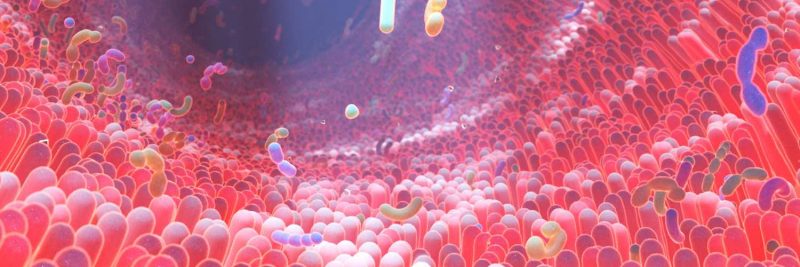Significant variations in the gut microbiome can be identified between people who develop pre-cancerous colonic lesions and those who do not. The Dutch study, abstract OP118, presented at United European Gastroenterology (UEG) Week 2023, held in Copenhagen, October 14–17, showed that the diversity of the gut microbiome was decreased in patients who went on to develop colorectal lesions.
“The study identified that both pre-existing and future colorectal pathologies are associated with the gut microbiome,” says lead author Ranko Gacesa. “Our findings suggest that the microbiome could act as a valuable tool to improve existing tests, advancing early detection methods for pre-cancerous lesions and colorectal cancer.”
Typically, colorectal cancer (CRC), which represents the second leading cause of cancer related death, develops from pre-cancerous lesions within the gut. Removal of the lesions offers an effective strategy for preventing development of CRC. However, existing non-invasive detection methods, such as the faecal immunochemical test, produce high numbers of false-positive results, leading to unnecessary colonoscopies. While CRC has been associated with changes in gut microbiota, the link between the microbiome and pre-cancerous lesions has been underexplored, and it has been unclear whether gut microbes can predict future onset of CRC.
The current study is part of Lifelines, a multi-generational, prospective cohort study including 167,000 people from the northern Netherlands (comprising 10% of the area’s population), designed to unravel the aetiology of multifactorial diseases. For Lifelines, major data collection initiatives take place every five years (2010, 2015 and 2020 etc), with the Dutch Microbiome Project based around the 2015 data collection.
The Dutch Microbiome Project, a large-prospective population study, was intended to determine the precise composition and function of the intestinal microbiome for 8,208 individuals from a three-generational cohort comprising 2,756 families. All participants provided faecal samples, which were analysed with metagenomic shotgun sequencing to profile bacteria present in the gut, the quantities of different bacteria, and broad biochemical functions of the bacteria. The team then linked data from the Dutch Microbiome Project 2015 collection to a Dutch nationwide pathology database (PALGA), which holds information from histology and pathology labs throughout the Netherlands. “The link allowed us to identify which participants developed colorectal polyps or cancer before the microbiome data was collected versus which participants developed them after,” Gacesa, from University Medical Centre Groningen, tells Cancerworld.
Altogether investigators identified 214 individuals who had developed pre-cancerous colorectal lesions between 2000 and 2015 (prior to faecal sampling): 106 cases with low-grade dysplasia; 24 with high-grade dysplasia; 60 with serrated polyps; and 26 cases of CRC. A further 305 individuals were identified who developed lesions between 2015 and 2022 (after faecal sampling):, 149 low-grade dysplasia; 78 high-grade dysplasia; 52 serrated polyps and 26 cases of CRC. The team also identified 202 individuals with normal colonoscopy findings, who were used for comparison as controls.
Results showed that microbiome diversity was decreased in participants who developed colonic lesions following sampling (false discovery rate <0.05, equivalent to a P value ≤0.05).
Microbiome composition and function differed between participants with pre-existing compared with future lesions as well as between those with different types of lesions. CRC, high-grade dysplasia, low-grade dysplasia and serrated polyps were all significantly associated with the total composition of the microbiome.
Bacterial species from the family Lachospiracea, and the genera Roseburia and Eubacterium were linked to future development of lesions. Furthermore, biochemical products produced by bacteria found to be associated with the development of lesions included aerobactin (a virulence factor bacteria use to take up iron), methanogenesis (the process whereby bacteria use methane gas to grow), flavine (a chemical that plays an important role in many biological processes), lysine (an essential amino acid), and quenosine (a nucleotide specific to bacteria not found in animals or humans).
The microbiome composition had a moderate predictive power for future lesions and CRC (AUROC ~0.7, equivalent to 70% correct prediction).
“We found that the gut microbiome of study participants who developed (pre) cancerous colonic lesions in 2015–2022 is significantly different from general population, implying that the gut microbiota might be involved in the development of colorectal lesions and cancer,” write the authors.
The team found that the associations between the microbiome and pre-cancerous lesions were similar to those that had been observed for cancer, although the effect sizes were lower. “This implies that changes in the gut microbiome are the result of not just cancer, but also pre-cancerous pathologies,” says Gacesa.
“Our results suggest that gut bacteria might be used to enhance currently used diagnostics for detection of colorectal polyps, and that microbiome-modulating therapies might play a role in prevention of colorectal cancer,” he adds. One future possibility, he suggests, would be to add tests for CRC-associated bacteria to the faecal tests currently used to screen for CRC.
The team are currently looking to find strain-level differences in bacteria linked to the development of CRC. In a second line of research, they are also investigating the chemicals produced by gut bacteria in participants who develop colorectal pathologies. “This will further our understanding of what might be causing cancer development and is important for designing future tests for cancer risk, as detection of specific small molecules is simpler than detecting specific bacteria,” explains Gacesa.
Ultimately, the team hope to perform a clinical trial exploring how well microbiome tests perform in detecting pre-cancerous lesions, cancer, and inflammatory bowel disease.












